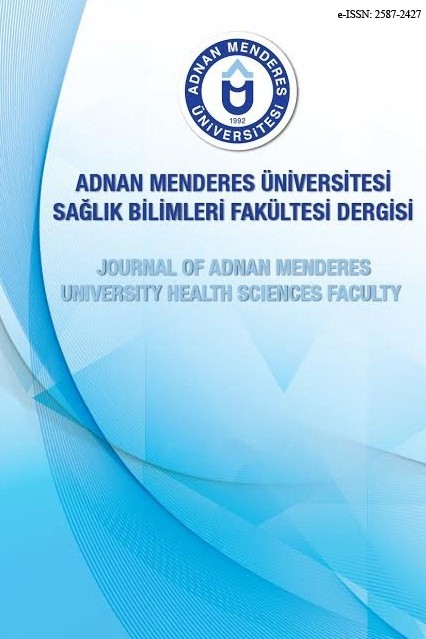Covid-19 Pandemi Sürecinde Uzaktan Eğitim Alan Öğrencilerin Uzaktan Eğitime Bakış Açıları ve Memnuniyetlerinin Değerlendirilmesi
Bakış Açısı, Memnuniyet, Pandemi, Uzaktan Eğitim, Distance education, Satisfaction, Pandemic, Perspective
Evaluation of Distance Education Perspectives and Satisfaction of Distance Education Students during the Covid-19 Pandemic Process
Distance education, Satisfaction, Pandemic, Perspective,
___
- 1. UNESCO. (2020). Teacher Task Force calls to support 63 million teachers touched by the COVID-19 crisis. 25.11.2021
- 2. Chick R. C., Clifton G. T., Peace K.M., Propper BW, Hale D.F., Alseidi A. A. et al. (2020). Using technology to maintain the education of residents during the COVID-19 pandemic. J Surg Edu,.77(4),729–32.
- 3. Allen I. E. & Seaman J. (2017). Distance education enrollment report 2017. 25.11.2021
- 4. Yaman B. (2021) Covid-19 pandemisi sürecinde Türkiye ve Çin’de uzaktan eğitim süreç ve uygulamalarının incelenmesi. OPUS Uluslararası Toplum Araştırmaları Derg, 17(Pandemi Özel Sayısı),3298–308.
- 5. Bates A. W. (Tony). (2015). Teaching in a digital age. Open Educational Resources Collection. St. Louis: University of Missouri.
- 6. Clark J. T. (2020). Distance education. In: Clinical Engineering Handbook. Elsevier, p. 410–5.
- 7. YÖK. (2020). YÖK Koronavirüs (Covid-19) Bilgilendirme Notu-1. 25.11.2021
- 8. Karadağ E., Yücel C. (2020). Distance education at universities during the novel coronavirus pandemic: An analysis of undergraduate students’ perceptions. Yuksekogretim Derg, 10(2),181–92.
- 9. Ally M. (2011). Foundations of educational theory for online learning. Athabasca University.
- 10. Chen B.H. & Chiou H. H. (2014). Learning style, sense of community and learning effectiveness in hybrid learning environment. Interact Learn Environ, 22(4),485–96.
- 11. Olapiriyakul K., Scher J. M. (2006). A guide to establishing hybrid learning courses: Employing information technology to create a new learning experience, and a case study. Internet High Educ. 9(4),287–301.
- 12. Omur Akdemir A. (2008). Teaching in online courses: Experiences of ınstructional technology faculty members, Turkish Online Journal of Distance Education, (9), 97-108.
- 13. Dinler E., Badat T., Kocamaz D. & Yakut Y. (2020) Evaluation of the student’s self awareness, physical activity, sleep quality, depression and life satisfaction of university students during the COVID-19. Int J Disabil Sport Heal Sci,(2),128–39.
- 14. Öncen S., Aydın S. & Molla E. (2020). COVID-19 pandemisi döneminde sokağa çıkma sınırlaması olan ve olmayan illerde yaşayan spor bilimleri öğrencilerinin fiziksel aktivite düzeylerinin değerlendirilmesi. J Turkish Stud,Volume 15(6),739–49.
- 15. Aktürk S., Büyükavcı R.& Aktürk Ü. (2019). Relationship between musculoskeletal disorders and physical inactivity in adolescents. J Public Heal,27(1),49–56.
- 16. Kołota A. & Głąbska D. (2021). COVID-19 pandemic and remote education contributes to ımproved nutritional behaviors and ıncreased screen time in a polish population-based sample of primary school adolescents: Diet and activity of youth during COVID-19 (DAY-19) study. Nutrients,13(5),1596.
- 17. Di Renzo L., Gualtieri P., Pivari F., Soldati L., Attinà A., Cinelli G., et al. (2020). Eating habits and lifestyle changes during COVID-19 lockdown: an Italian survey, J Transl Med,18(1),229.
- 18. Korkut Gençalp D. (2020). COVID- 19 salgını döneminde ilk ve acil yardım öğrencilerinin beslenme alışkanlıkları ve fiziksel aktivite durumlarının değerlendirilmesi. Paramedik ve Acil Sağlık Hizmetleri Derg,1(1),1– 15.
- 19. Keskin M., Özer Kaya D. (2020). Covid-19 sürecinde öğrencilerin web tabanlı uzaktan eğitime yönelik geri bildirimlerinin değerlendirilmesi. İzmir Katip Çelebi Üniversitesi Sağlık Bilim Fakültesi Derg, 5(2),59–67.
- 20. Chingos M. M., Griffiths R. J., Mulhern C., Spies R. R. (2017). Interactive online learning on campus: Comparing students’ outcomes in hybrid and traditional courses in the University System of Maryland. J Higher Educ, 88(2),210–33.
- 21. Means B., Toyama Y., Murphy R. & Baki M. (2013). The effectiveness of online and blended learning: A meta-analysis of the empirical literature. Teach Coll Rec, 115(3),1–47.
- 22. Kuo Y. C. & Belland B. R. (2016). An exploratory study of adult learners’ perceptions of online learning: Minority students in continuing education. Educ Technol Res Dev, 64(4), 661–80.
- 23. Furlonger B. & Gencic E. (2014). Comparing satisfaction, life-stress, coping and academic performance of counselling students in on-campus and distance education learning environments. Aust J Guid Couns, 24(1),76–89.
- 24. Tüzün, F. & Yörük N. (2021). Pandemi döneminde uzaktan eğitimi etkileyen faktörler. Ömer Halisdemir Üniversitesi İktisadi ve İdari Bilim Fakültesi Derg, 14(3), 822–45.
- 25. Guest R., Rohde N., Selvanathan S. & Soesmanto T. (2018). Student satisfaction and online teaching. Assess Eval High Educ, 43(7), 1084–93.
- 26. Young S. & Bruce M. A. (2020). Student and faculty satisfaction: Can distance course delivery measure up to face-to-face courses? Educ Res Theory Pract, 31(3), 36–48.
- 27. Dziuban C., Graham C. R., Moskal P. D., Norberg A. & Sicilia N. (2018). Blended learning: the new normal and emerging technologies. Int J Educ Technol High Educ, 15(1), 1–16.
- 28. Lage M. J., Platt G. J. & Treglia M. (2000). Inverting the classroom: A gateway to creating an ınclusive learning environment. J Econ Educ, 31(1), 30.
- 29. Korzycka M., Bójko M., Radiukiewicz K., Dzielska A., Nałęcz H,. Kleszczewska D., et al. (2021). Demographic analysis of difficulties related to remote education in poland from the perspective of adolescents during the Covid-19 pandemic. Ann Agric Environ Med, 28(1), 149–57.
- 30. Zalat M. M., Hamed M. S. & Bolbol S. A. (2021). The experiences, challenges, and acceptance of e-learning as a tool for teaching during the COVID-19 pandemic among university medical staff. PLoS One, 16(3), e0248758.
- Yayın Aralığı: Yılda 3 Sayı
- Başlangıç: 2017
- Yayıncı: Aydın Adnan Menderes Üniversitesi
Ebelik Öğrencilerinin Serbest Ebelik Konusundaki Görüş ve Beklentilerinin İncelenmesi
Aysun EKŞİOĞLU, Zehra BAYKAL AKMEŞE, Ummahan YÜCEL, Emine DEMİR
Adile BOZKURT, Ayşe İNEL MANAV, Esra ÜNAL
Hipertermik İntraperitoneal Kemoterapi Uygulaması: Çalışan Güvenliği
Nurcan BOYACIOĞLU, Sultan ÖZKAN
Yeni Besin Deneme Korkusu: Obezite Gelişiminin Hem Nedeni Hem Sonucudur.
Hastanede Yatarak Takip Edilen Covid-19 Tanılı Hastalarda Aşılanma Durumu
Ali Seydi ALPAY, Haluk ERDOĞAN, Aşkın ERDOĞAN, Naciye ÖZEN
Hemşirelik Öğrencilerinin Sosyal Zeka Düzeyleri ve Etkili Bazı Değişkenler
Ali TAYHAN, Aynur ÇETİNKAYA, Çiğdem SABIKMA, Pınar BİNTEPE
İlkin YILMAZ, Dilek ÖZDEN, Gülşah GÜROL ARSLAN
Serdal ÖĞÜT, Ömer ERDOĞAN, Aslıhan BÜYÜKÖZTÜRK KARUL
Afgan İşgücünün Çalışma Hayatına İlişkin Tecrübeleri: Denizli İli Örneği
Gebelerin Psikososyal Sağlık Durumları İle Annelik Rolü Algısı Arasındaki İlişki
